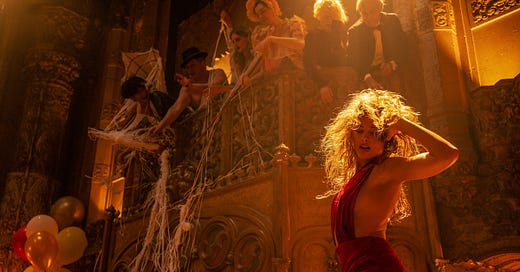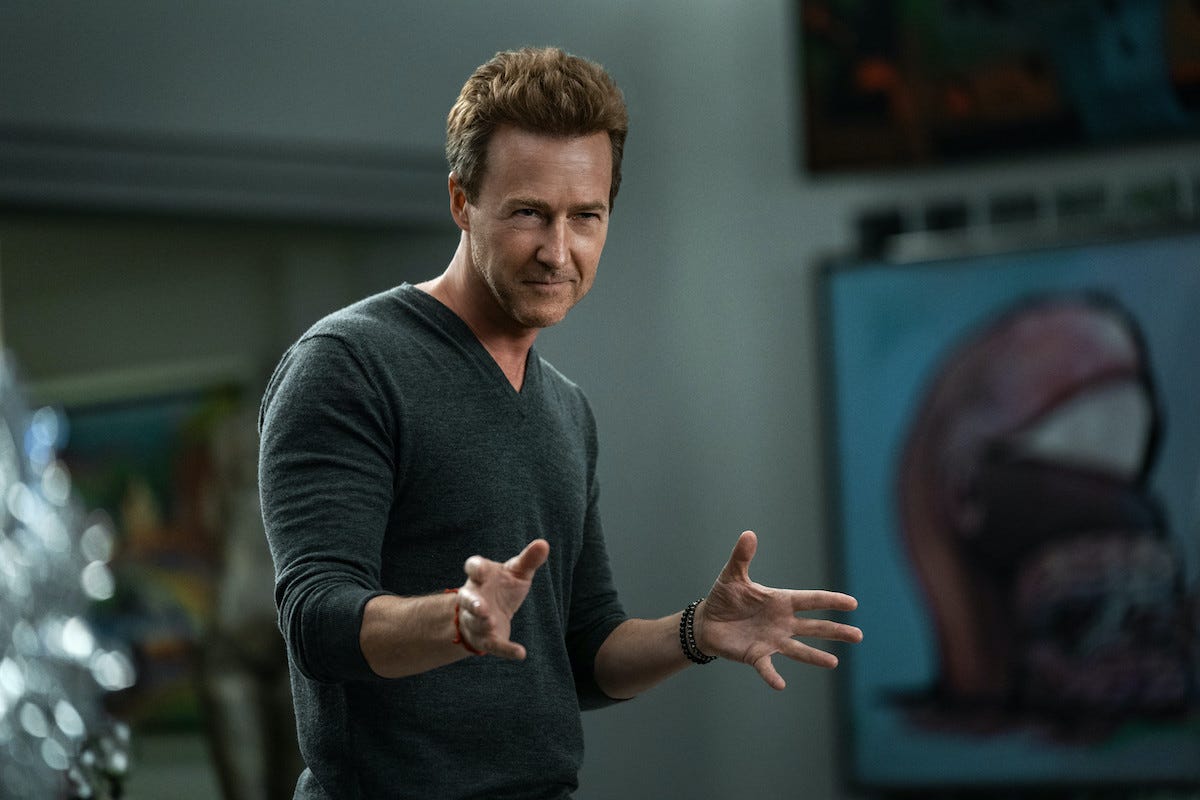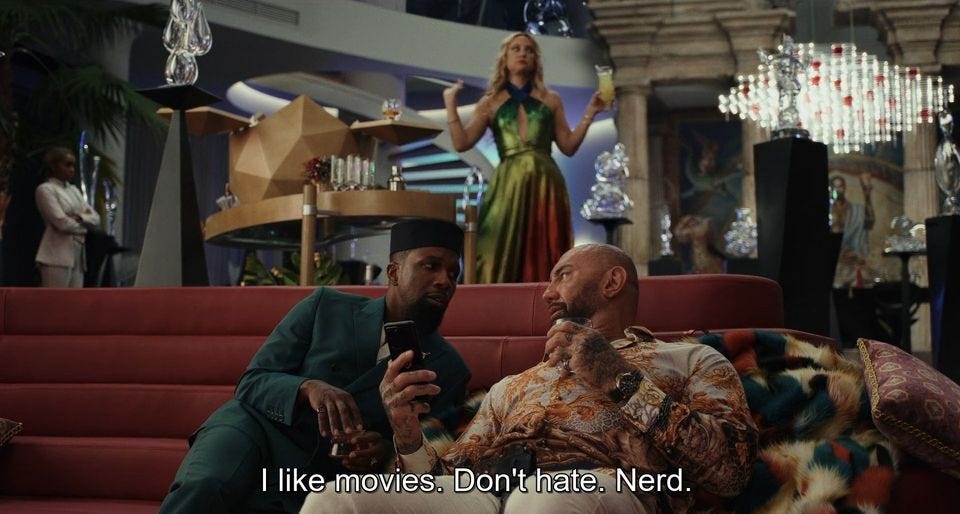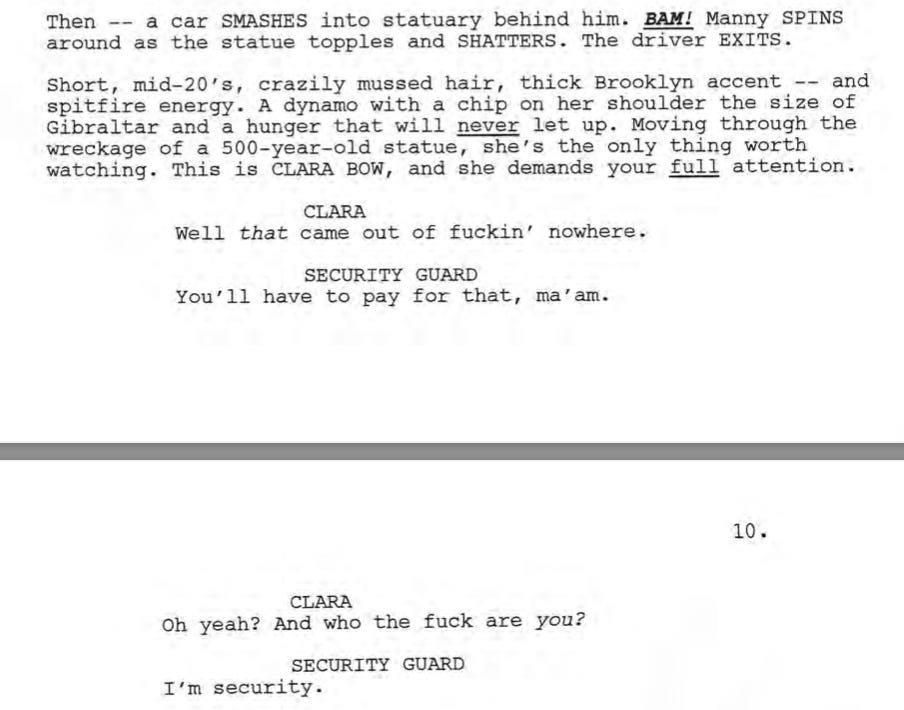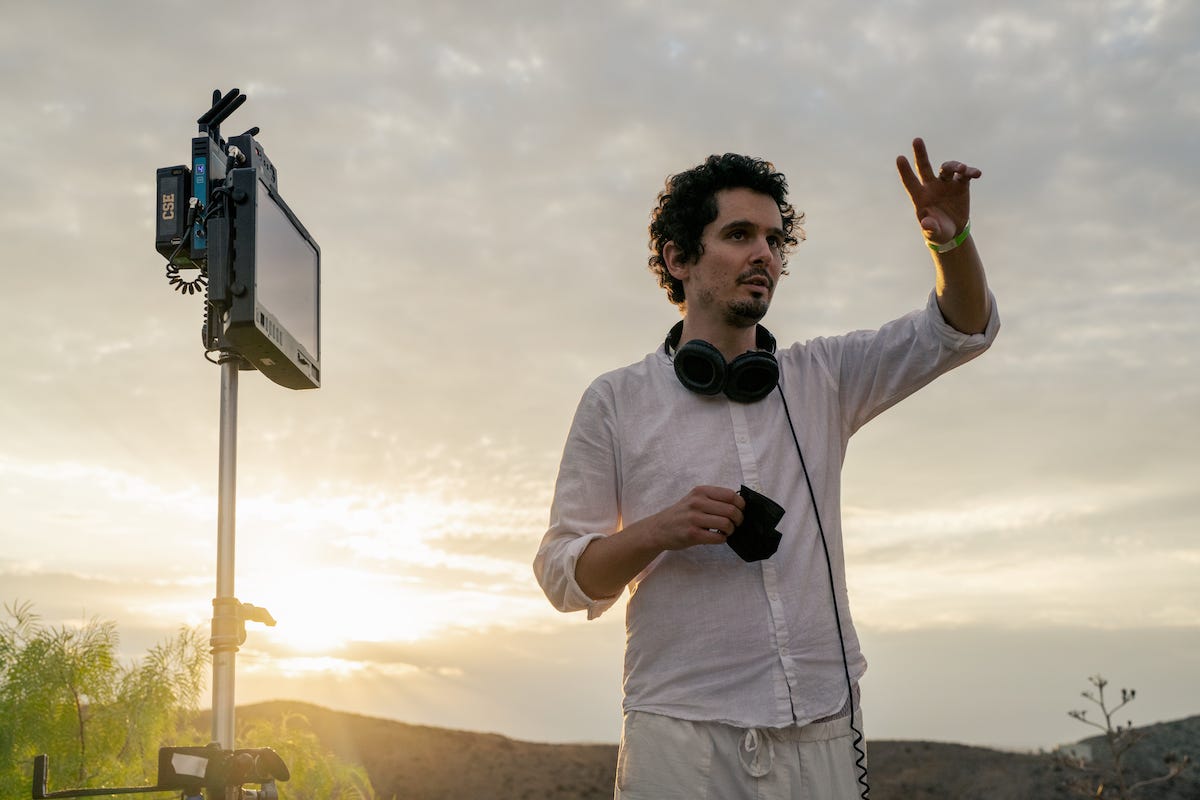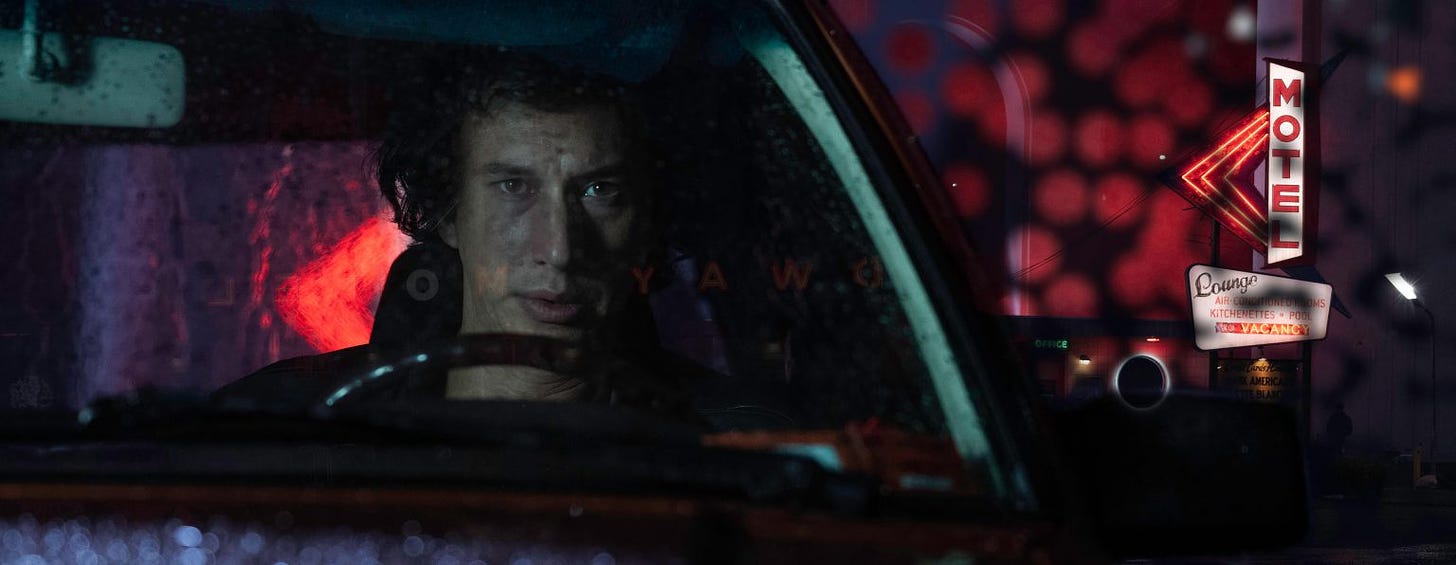Links & Looks. December 2022
Glass Onion; Babylon, the "Fuck You" Movie; Waffle House Action; Avatar 2: Wet 'n' Wild; Love 'n' Hate For White Noise
Notes from mornings after.
There was a burst of bunkum on Twitter about Glass Onion after its pre-Christmas Netflix streaming debut, begun by semi-literate snark from a subsidized podcaster, who, like many of their respondents, took Rian Johnson’s second Benoit Blanc picaresque, set at the beginning of the pandemic and written and produced months ago, as a direct and contemporary attack on multibillionaire multitasker and multi-shitposter Elon Musk.
My contribution: “Glass Onion makes hay of the filthiest rich, as well as snuffling sycophants that lap at their leavings. (The central boor could as well be Trump or Buffett.) How could even the most slovenly viewer take it as a broadside against a single comet? It’s a pissed-off comedy that punches up.” Matt Zoller Seitz hopes that the third in the series “pivots yet again and gives us Daniel Craig and Hugh Grant as the same-sex incarnation of Nick and Nora Charles solving murders and sassing each other and drinking an endless array of cocktails you’ve never heard of.” (Review here.)
Action At Austin Waffle House: one of the year’s best action sequences.
Babylon bombast: Posts film historian Mark Harris: “You don't have to like Babylon to root for a moviemaking system in which many, many directors get to make their Babylons and then get the chance, and the money, to get right back on the horse. All this pious tut-tutting about "arrogance" is gross and reactionary.” To a picayune reply expressing concern for the cost of Babylon, Harris replied, “There are no ‘investors.’ It's not a Broadway show. No individual human being is ever made poorer by the failure of a studio movie.”
Adam Nayman at The Ringer: “Hollywood history is littered with titles whose directors had reason to fear that they might never work in this town again, but Babylon is on the short list of movies that seem almost deliberately designed as career killers. It is, on some level, an affront to its subject matter and its audience, yet the mix of exuberance, insolence and white-hot melancholic guilt at its core makes it just as hard to hate as to love.”
(Babylon, 2019 draft.)
Before the release of La La Land, I talked to Damien Chazelle about the history of gargantuan folly in a century of cinema as well as the notion of the “fuck-you movie.” "The thing that I’m most worried about, that I find myself fighting against the most, with each movie being a little more difficult than the one before,” the now-thirty-seven-year-old director told me in 2016. “It’s the level of second-guessing, the level of once you’ve gone up to bat, once or twice or three times before, it’s that much more, you have that many more narratives in your head of how it can go wrong. Those are the voices that probably get louder and louder and you have to keep fighting.”
Paul Thomas Anderson went to dinner at some nice place in L.A. with Warren Beatty after Boogie Nights, and Beatty asked, “Well, what do you want to do next?” Anderson says, “I got this thing, Magnolia, I want to do.”
“What’s Magnolia?” Beatty asks. Anderson tells him Magnolia.
Beatty goes, “Oh yeah! That’s your fuck-you movie.”
“My fuck-you movie? What’s that?”
“Well, you’ve earned your fuck-you movie. Now you’ve accomplished that, you have to make this, or you’ll never be allowed to make it. You’ll never allow yourself to make it.”
“Yeah!” Chazelle said. “The fuck-you movie. I love that. I think the fuck-you element was probably whenever, well, it was the fact that whenever people would ask me, what I was following Whiplash up with, I’d say, um, I’m doing this musical, this original musical that my college roommate and I came up with. They would just be like, ‘What is wrong? Fuck. What is wrong with you? Why are you going to waste the precious capital you have now on something that will undoubtedly set you back? To the Stone Age.’ I wanted to say fuck you to those people, yes.”
There’s a crisp chronicle of towering temerity by filmmakers in their moment: film critic Stuart Klawans wrote a book called “Film Follies: The Cinema Out of Order,” I say. Chazelle all but guffawed. You know that book? He nodded. “The Fitzcarraldos, the Heaven’s Gates, the Apocalypse Nows.” And the biggest swoon of them all, I add, Leos Carax’s luck-blighted romantic epic Lovers on the Bridge. “Ohhh. Now that’s my favorite folly,” he said, leaning forward. “That’s the greatest. If you like La La Land, you’ll love Lovers on the Bridge!” He laughed. “They built an entire Paris, basically, to do stuff that when you see the movie, you can tell why. It was the most expensive movie in French history to that point and it bankrupted everyone. Except it’s incredible, it’s one of the great movies. I’ve seen every one of his movies.”
At any point, once the cameras were rolling, were you fearful, or did just the effort of filmmaking, day-to-day, prevent you from the second-guess, “Oh, this might just be a mistake”? A pretty big one?
Chazelle laughed. “There was probably enough time to second-guess. There just wasn’t enough time for the second-guessing to ruin things.” (A deadline review with more of that 2016 conversation here.)
Damien Chazelle.
Film critic Kyle Turner posts a prime note on Twitter, “Babylon is Damien Chazelle’s Cecil B. Demented by way of Serial Mom and Kenneth Anger… A lot of Babylon’s vulgarity seems at times self-conscious, like nerd who started doing narcotics later in life; but i love the film because it bizarrely straddles intellectualizing the throng, the bacchanalia, & letting something in those scenes (esp w Robbie/Calva) combust… It earns a lot of its weirder and, perhaps, more dubious moments because, as confident as Chazelle is in his technique, his constant return to themes of stardom, greatness, labor, and industry implies a little bit of imposter syndrome, that he’ll never be as great as what he loves. Which is what makes the film work. That anxiety and self criticism permeates the film.”
Film historian Joseph McBride, on Facebook: “I saw Babylon last night and love it. Such a sad movie about the tragic decline and fall of a great film industry and the art form it helped create (at least that's my interpretation of the film, though how you read it depends on your view of what has happened to Hollywood since the film ends in 1952 with the protagonist weeping in a movie theater yet slightly smiling with pride at his role in the passing parade). I recalled that more than 50 years ago I started taking notes for a similar project about the tragic life and career of John Gilbert, which I was calling ‘The Captain Hates The Sea,’ after the title of his last movie. My version would have been more sober and dramatic than the Cecil B. DeMille-on-Acid fantasmagoria Chazelle provides, but I thought even the excesses deplored by some reviewers fit the subject well (including the visualization of the classic joke about Hollywood with the elephant at the beginning, which I appreciated, having lived through it metaphorically myself). I also tried to pitch a book project in the late 1990s about the decline of American cinema, ‘Twilight in the Smog’ (after a description of Hollywood by Orson Welles in 1959), but publishers thought I was too pessimistic, but it's mostly come true.
DP Linus Sandgren talks the look for Kodak: "When we came to discuss the aesthetic look of the film together, Damien was quite clear that he did not want Babylon to feel like a typical period movie or to be polished in any way. He wanted the opposite—for it to be quite rebellious, a chaotic circus, where we would explore the grit, the filth, the shitty backside of things that the characters experience with a camera that would be alive and curious to explore their world, almost a persona in itself running around and observing the action and connecting with the characters." (The $80 million Babylon opened on 3,343 screens in North America on December 23. Its domestic gross after eight days is about $7.5 million.)
Avatar 2: Wet ‘n’ Wild, as a friend spells out in texts the billion-plus-grossing Avatar: The Way Of Water, remains on about 4,200 screens. The international till has rung up well over a billion dollars—two billion on the way, oh hi, Top Gun: Maverick—the daily cash intake pouring into the minute-by-minute, fraction-of-a-section market of currency trades, making money off the money sluicing past as much as the premium-priced tickets to its three hours and eighteen minutes.
Irish novelist Adrien McKinty, who wrote “The Chain,” may be the only observer to bring up Neruda to date, posting, “took the kids to Avatar 2 we're with Guillermo del Toro on this one & loved its a Helmholtz–Kohlrausch acid trip into Jim Cameron's dreams & obsessions & a taut JC action movie for the final act full house clapped at the end to quote Neruda, ‘green was the silence, wet was the light.’” (My review here.)
White Noise.
“Good Fight” and “Good Wife” co-showrunner Robert King tub-thumps White Noise, also streaming on Netflix: “One of the best movies of the year. A comedy about people trying to avoid the subject of death. Adam Driver, Greta Gerwig, and the kid actors are exceptional. The Noah Baumbach overlapping dialogue is hilarious. 80s production design pops.” Journalist Ron Rosenbaum just thumps it: “So I'm a big Don DeLillo fan (read ‘Libra,’ a Great American Novel ) [and] also a mostly admirer of Noah Baumbach's films but he's over his head w/ White Noise. DeLillo's work is mostly disconnecting the dots & the spaces in between. This film sadly: too much filling in those spaces.” (A less-than-enthusiastic review here; a short burst on words like “dread” in DeLillo here.)
